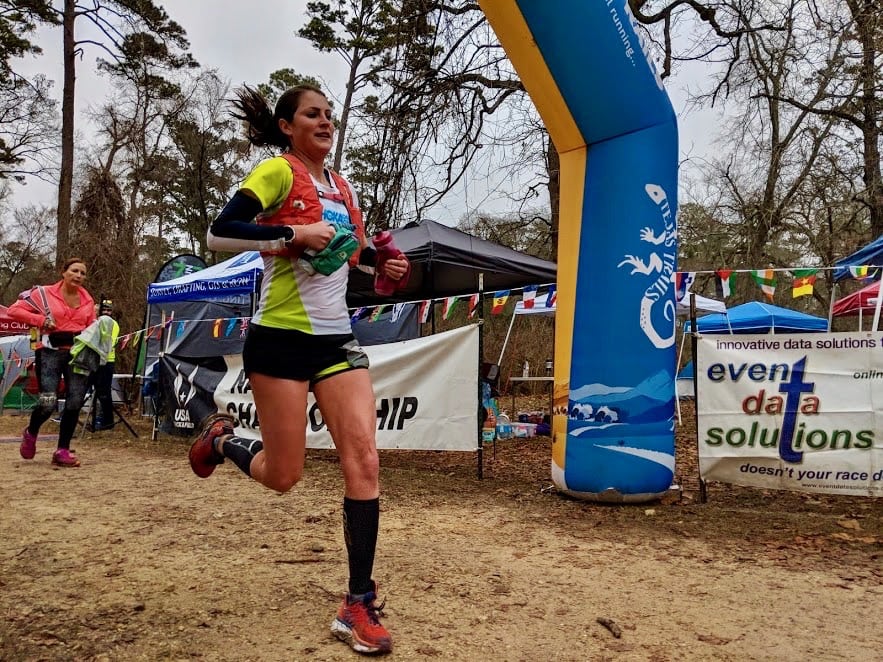I remember finishing my first mountain 100 miler. The final few miles included a rocky, technical descent on tired legs that required a great deal of focus to avoid falling, and I had two objectives — (i) finish as quickly as I could, and (ii) finish in possession of all of my teeth, in proper order, still in my mouth.
When I crossed the finish line, I felt relief for sure, as well as happy, sad, rueful, and proud. I had specific regrets I could name — such as sections of the course I did not push as hard as I should have, and small moments when I was fickle or irresolute. I wanted to re-run the race to fix those things. I also felt some degree of satisfaction for having completed the event, since running 100 miles is a challenge — something I knew only theoretically before the event, and by experience after. I was happy to be done and sad that it was over. I felt a lot of things, but I am certain that I did not feel content.

Sabrina Little on her way to winning the 2018 Rocky Raccoon 100 Mile, a decade on from finishing her first 100 miler. Photo: USATF Mountain Ultra Trail Council/Richard Bolt
The Landscape of Post-Race Emotions
There is an expression in the running world: “Emotions can cook your food or set your kitchen on fire.” The idea is that the emotions you experience in a race — irritation, frustration, joy, gratitude, offense, boredom, and otherwise — can be a great source of strength if rightly directed, but they can cause your undoing if not.
For example, if you are frustrated by a miscommunication with your crew and dwell on it, this can be a distraction and an energy cost. But if you let it go, or — even better — redirect your frustrations into your effort, this can be a source of strength. Excitement can make you feel bulletproof and energized, but if you don’t manage excitement well, you will figuratively “set your kitchen on fire” by starting the race too quickly. A substantial part of racing well is learning how to superintend emotions.
Through racing, I have learned a lot about emotion management. I have learned that, if you feel particularly bad or particularly good, just wait a few miles; emotions generally regress to the mean. I have learned that emotions shout at you when you are tired. And I have learned that there is a difference between “feeling bad” and “feeling bad for yourself.” The latter imperils more races than the former.
But the landscape of emotions post-race is something I am still learning how to manage. In particular, I am learning how to be content. Even the best races are full of big and little failures, and when these are still fresh on your mind, it can be a challenge to lead with gratitude and appreciation, rather than with regret and an incessant need to improve. Frankly, I have had so many bad races at this point that, if I do not figure this out, I will have enough chips on my shoulder to feed an entire Superbowl party.
So, how can I learn to be content?
The Concept
To be content is, “to appreciate the good in one’s present condition (1).” It is a virtue that consists of “knowing when enough is enough, of being properly satisfied, and of not wanting more than is needed for a good life (2).”
Contentment counters the acquisitive nature of our culture — a culture fueled by greed that always wants more instead of appreciating what one already has. It counters the industriousness and workaholicism that compel us to keep working without any clear vision of what we are working for, and without any gratitude for what we have already achieved.
It also counters the insatiable striving of the distance runner, struggling to reconcile present satisfaction in one’s current abilities with the desire to improve. This is a difficult balance — leading with appreciation and gratitude while also wanting to be better — and there are many popular misconceptions about what contentment involves. In what follows, I clarify the nature of contentment in distance running.
Contentment Is Not Complacency
Oftentimes, we speak this way — that if we are truly content with our performances, this means we do not aspire to anything better. We speak as though contentment means we cease to be driven to improve. But contentment is not at odds with improvement. In fact, it offers a sturdier ground for improvement than a lack of contentment does because there is rest and security in contentment, instead of feelings of inadequacy or loss. It is difficult to sustain improvement, long-term, driven by a sense of inadequacy. Feeling inadequate is exhausting.
Philosopher David McPherson clarifies, “[Contentment] does not deny that we ought in many ways to seek improvement, but it acknowledges … that we need to find a way to be at home in the given world amid imperfection. This requires that we cultivate a grateful or appreciative orientation to the world (3).”
You Can Be Content With the Wrong Things
To be clear, there are times when we ought not be content. For example, if your life is oriented toward empty things — like a quest for popularity or attention — then it is appropriate that we do not find satisfaction in these objectives. If we experience unease while in pursuit of these things, then this is a sign that we should re-evaluate our goals, rather than work harder to cultivate contentment toward the wrong objects.
Philippa Foot points out that “a man is harmed if he is taught to be content with small pleasures and made unfit for enterprises requiring daring and independence (4).” A rich human life consists of more than the striving for trivial, empty things.
Arrival Is a Fallacy
Shortly after crossing the finishing line of one of the biggest races of my life, I thought, This is what I have been waiting so long for, … followed by a question: THIS is what I have been waiting so long for?!
There is a common misconception that after we accomplish some big goal, then we will have arrived, and this will substantially change something about us or our position in the world. This is just not true. There are always new events to register for and new mountains to summit. And, as soon as you complete your big goal, someone will, almost immediately, ask you what your next race is.
Achievement is like a trick escalator that never arrives at its destination. So, if you are withholding contentment until the big day when you accomplish whatever grand objective you have set out as the ultimate goal in your life, you will be sorely disappointed when you never arrive. You need to find contentment here, now, or you will never be content at all.
Final Thoughts
There is always a peculiar mixture of emotions when you cross a finish line. You are annoyed with your frailties and moments of weakness, relieved to be done, sad about missed opportunities to push harder, and longing for the next race to prove yourself. It is difficult to be content in these moments. But I often look back at what have been great races in my career, and wish — in retrospect — that I celebrated those moments more.
Contentment is a difficult virtue for driven people, which distance runners often are. But it is a virtue worth pursuing — to meet the world with appreciation and gratitude — because the alternative — inadequacy-driven despair — is not a sustainable way to be an athlete or a posture that supports a flourishing life.

Tim Tollefson at the finish of the 2021 Western States 100, having placed fifth. Photo: iRunFar/Alex Potter
Call for Comments
- How have you felt at the finish line of a much-anticipated race?
- Was it how you expected to feel?
References
- Cheshire Calhoun (2017). On Being Content with Imperfection. Ethics 127(2): 327-352.
- David McPherson (2022). The Virtues of Limits. Oxford University Press, 35.
- David McPherson (2022). The Virtues of Limits. Oxford University Press, 3.
- Philippa Foot (1978). Virtues and Vices and Other Essays in Moral Philosophy. University of California Press, 93.

